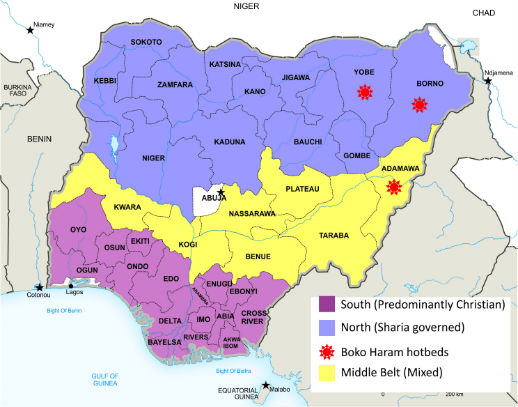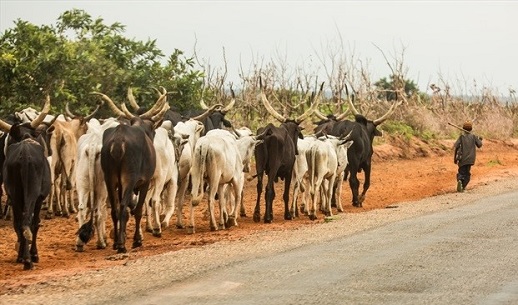Fulani herdsmen continue to attack unprotected Christian communities with impunity in Nigeria’s Middle Belt. World Watch Monitor
”It all started on Friday when the herdsmen forcefully entered our village to graze on farmland, but were resisted by our youths. They left – only to mobilise and storm our village in their numbers, shooting sporadically and chasing everyone from their houses.”
A survivor of a recent Fulani herdsmen’s attack in Benue state. It came on the heels of many others which have taken place in Guma, Agatu, Naka and several other LGAs, as WWM has reported in the past.
The death toll between 10-20 March has risen to 60, says Nigeria’s Police Chief, who says today he’s deploying a special tactical force to deal with the continuing violence.
The attack on Friday 10 March, 2017 began in Mkgovur village, on the outskirts of Buruku town. When the Hausa Fulani Muslim herders were prevented from grazing their cattle on the farms of the indigenous Christian community, they came back later, armed with sophisticated weapons. They shot and killed anything in sight. By the time the villagers realised, about ten people had been killed; several others were missing. Others had to flee to the neighbouring Gboko Local Government Area.
Mallam Garus Gololo, Chairman of the Miyetti Allah Cattle Breeders’ Association (an umbrella organisation that looks after the interests of the Hausa Fulani Muslim herders across West Africa), denied that the attack was carried out by the herders in Benue state. He claimed that the attackers were not the ‘ordinary’ Fulani who, he said, ‘have no other interests than to look after their herds.’ He told This Day Live that they may have come from another Middle Belt State, Taraba.
There are also reports that this particular Fulani group are too heavily armed and very sophisticated, that they seem to come from places beyond Nigeria, as the Governor of a third Middle Belt state, Kaduna, has affirmed about Fulani attacks in his state.
However, the recent Fulani attackers appeared to have a good geographical knowledge of the local communities and the villages. After the attack in Mkgovur, another attack was carried out two days later in the village of Tombo-Mbalagh, Buruku LGA. This Hausa Fulani Muslim herdsmen attack was directed mostly against an unarmed Christian population going about its normal business. About eight people were killed and three others were reported missing.
According to Justina Sorkaa, the Council Area administrator, the dead included women and children. Most of those affected or displaced by this Saturday 11 March attack have moved to stay with relations in Gboko and Buruku towns, while others have been accommodated in a makeshift IDP camp at St. Peter’s Anglican primary School, Imenger.

Before the intervention of security services, another attack was carried out by the herdsmen in the early hours of Tuesday, 14 March, 2017. This attack took place at Wanune, headquarters of Tarka LGA. In retaliation, some of the Christian survivors used the corpses they were able to recover from the attack to block the highway in Wannune, a major road that links Makurdi (the Benue state capital) and Gboko (which is considered the cultural capital of the state). The road blockage was not only a show of defiance, but also a demonstration against government ineptitude and security lapses. It was a sign that the local people have lost patience with, and confidence, in the government to protect them.
Speaking on Channels Television on 15 March, the state governor, Samuel Ortom confirmed that there is a limit to which he can ask the people of the state to be patient.
If the federal government did not intervene, locals say retaliatory attacks may be likely. The demonstration was also linked to the . Through this programme, the government disarmed many of those fighting to defend their communities from herdsmen’s attacks. The local perception is that after this disarmament, the government has abandoned the people, providing no security for communities, nor physical and material support for victims who are living in makeshift camps in different parts of the state. At the same time, the herdsmen continue to move freely in the state, attacking and destroying villages as they move.
Following the 11 March attacks and the rising tension in Benue state, the governor, Samuel Ortom, has ordered the herdsmen to immediately leave Tombo-Mbalagh and other affected areas in Benue state. He called on the federal government to complement the efforts of the state government in ending the conflict. He made it clear that Benue state has no land for grazing and the herdsmen should relocate elsewhere. The Benue State commissioner of Police, Bashir Makama has equally ordered his men to shoot-on-sight anyone seen armed or carrying a gun.
Many critics have raised concerns regarding the government’s security pronouncements. One of the community leaders in Tombo-Mbalagh, who preferred not to be named, questioned why the government should ask security forces to accompany the herdsmen out of the affected areas. Where will the herdsmen be sent to? And what about the crimes they have committed? The policy, in the opinion of the community leader, demonstrates a lack of clear vision in ending the conflict. It perpetuates impunity and shows that those who kill can simply be asked to leave the place, only to go and kill somewhere else. Importantly, it suggests lack of prosecution for perpetrators and a complete disregard for victims.
While the government struggles to find solution to the problem, the killing continues. Benue state is a Christian majority state, with limited settlements of Muslims within some urban centres of the different local government councils. However, it is fair to say that the Hausa Fulani Muslim herdsmen attacks have been selective, targeted mostly at Christian villages, communities and settlements . The attacks are equally strategic because the perpetrators sometimes target villages that are difficult to access immediately, and attack at a time (late evening and early morning hours) when security services are considered inactive.
